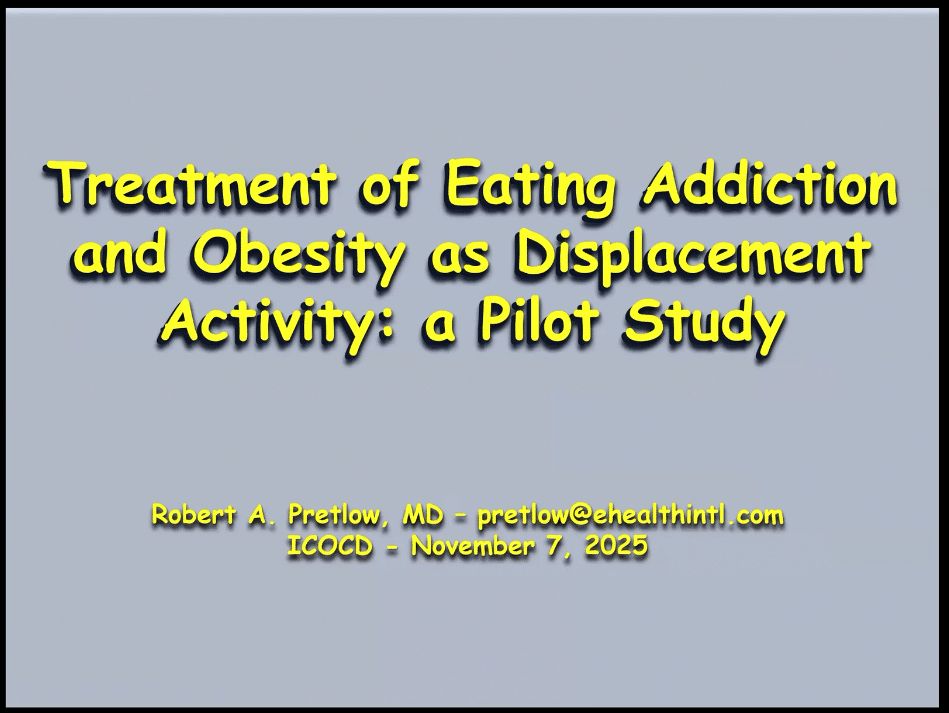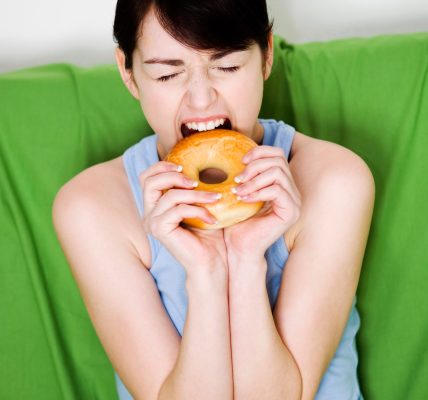BrainWeighve Is a Displacement Intervention

For several decades, Dr. Robert A. Pretlow has been studying the causes of childhood obesity and designing interventions to reduce compulsive eating in children. Dr. Pretlow is a Fellow of the American Academy of Pediatrics, author of the book Overweight: What Kids Say, publisher of Childhood Obesity News, and publisher of AddictionNews.
Earlier this month, Dr. Pretlow made a virtual presentation at the 9th International Conference on Obesity and Chronic Diseases (ICOCD2025). His presentation was part of the session track Childhood Obesity: Treatment and Prevention. His topic was the BrainWeighve displacement intervention currently in a trial at UCLA.
Entitled “Treatment of Eating Addiction and Obesity as Displacement Activity: A Pilot Study,” the 18-minute video presentation is now available to the public. It begins with a discussion of displacement and ends with a discussion of GLP-1 drugs.
Displacement
Displacement is what you do when you don’t know what to do. Facing a problem that cannot be readily solved is stressful. This stress is displaced by engaging in something — anything, really — to take the mind off the stress.
For stressed children, the thing that so often takes their mind off their problems is snacking. Almost every aspect of eating is soothing, including hand movements, jaw movements, taste, touch, and smell. Five minutes into the presentation, Dr. Pretlow lays out his hypothesis:
Displacement activity causes overeating.
Eating stops the brain from dwelling on the stress. Repeating this solution over and over turns eating into an addiction, where children become hooked on cues that constantly remind them to eat: the sights, sounds, smells, and tastes of food.
Rechanelling
In an earlier study, Dr. Pretlow found that the most effective interventions when food urges hit were distractions. One of the most effective distractions is a rancid smell; sniffing something vile can stop food cravings in an instant. Other effective ways to surf the urge are deep breathing and hand-squeezing.
There are many things one can do in the moment to turn the attention from consumption. For something that lasts longer than a moment, training can help children learn to leave a problem environment, such as a kitchen, or to always leave home with a healthy snack, so they aren’t as tempted by unhealthy foods they will likely encounter.
Rechanneling to activities that occupy the mind has been shown to be much more effective than rechanneling to passive activities such as watching videos or listening to music. Of the distractions that were effective, 86% were active and 14% were passive. Research from these earlier studies led to the design of the BrainWeighve displacement intervention.
What Is BrainWeighve?
BrainWeighve is an integrated intervention designed to treat obesity and eating addiction among children and teens. It involves a smartphone app where children track their weight and other vital statistics on a daily basis that can be shared with parents, caregivers, and medical providers.
Children set up their own BrainWeighve apps by providing a list of their problem foods, a list of stressful situations that cause them to overeat, and action plans for how to deal with each of these situations without overeating. BrainWeighve then helps them eliminate one problem food at a time, with encouraging results.
BrainWeighve is currently midway through a four-month trial involving 30 overweight teens. The preliminary results are very encouraging. Subjects report a reduction in “food noise,” which results from feelings of chronic stress combined with abundant food cues.
Having plans available at the moment a food urge attacks is critical in retraining the mind to relieve stress through healthy habits, not binge eating. It gives kids the confidence to endure the cravings, and they can see the results in weight loss, which is reinforcing.
Ultimately, Dr. Pretlow notes, the displacement will only go away if the sources of stress are resolved. Displacement can be rechanneled into healthy hobbies, but it won’t quiet down until the stress is eliminated. Until then, BrainWeighve and AddictionNews will help you surf those cravings with the confidence that you can change.
Written by Steve O’Keefe. First published November 19, 2025.
Sources:
“Treatment of Eating Addiction and Obesity as Displacement Activity: A Pilot Study,” a presentation by Dr. Robert A. Pretlow at the 9th International Conference on Obesity and Chronic Diseases, November 7, 2025.
Image Copyright dolgachov.




